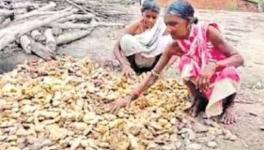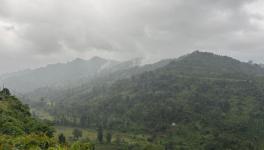BJP’s Citizenship Conundrum Hurts it in West Bengal
Image Courtesy: Picpedia
The Bharatiya Janata Party government in Gujarat has announced it will provide citizenship to Hindu refugees from three districts based on the Citizenship Act of 1955. The party may have hopes it will bring success in the upcoming Assembly election. But this announcement has created problems for the BJP in West Bengal. It has led to significant discontent among the Matua community of the State. In the 2019 Lok Sabha election and the 2021 Assembly election, this Scheduled Caste community strongly supported the BJP.
The Matua community had come to West Bengal as refugees from erstwhile East Pakistan (now Bangladesh) after the partition of India. They dominate in 21 Assembly constituencies of the Nadia district and parts of North and South 24 Parganas of South Bengal. Their primary reason for supporting the BJP is the hope of getting citizenship through the Citizenship Amendment Act of 2019.
The BJP’s other solid support base in West Bengal is the Rajbanshi (who call themselves Deshi) and Koch communities, recognised as Scheduled Tribe in North Bengal. This community supports the BJP for the National Register of Citizenship or NRC, as they wish it would be used to drive out the non-tribals from their ancestors’ land. That is also why they are against the CAA, which enables granting citizenship to specific categories of immigrants.
After announcing in Gujarat that it would give citizenship to Hindus, BJP’s leadership in West Bengal assured the Matua community that the government would very soon implement the CAA. On the other hand, to lure the Rajbanshi and Koch, the party has floated the reassurance of converting North Bengal into a Union Territory. Votes of tribals are crucial for the BJP in the upcoming panchayat elections in the State and the Lok Sabha election in 2024. Rajbanshi votes are the deciding factor in more than 30 Assembly seats in North Bengal. So, its identity politics has become quite a headache for the party’s leadership in West Bengal.
In the 1982 and 1987 Assembly elections in West Bengal, the BJP’s vote share remained below one per cent. In the 1991 Lok Sabha election, it got 11.65% of the votes, courtesy of the Ram Janmbhoomi movement. BJP leader and former deputy prime minister Lal Krishna Advani’s rath yatra propelled its popularity to rise in the State. In the 1996 Lok Sabha election, the BJP got just 6.88% of the votes, but it did not return to the lows of 1987. That year, Mamata Banerjee, the current Chief Minister, left the Congress party and formed the Trinamool Congress (TMC). In 1998 and 1999, a BJP-TMC alliance fought the Lok Sabha elections and secured 37.95% of the votes. It wasn’t easy to measure the votes cast for the BJP at the time, for it contested as part of an alliance. However, in the 2014 Lok Sabha election, the BJP got 17.02% of the votes by contesting independently.
Since then, its strategy in West Bengal has been to woo the Scheduled Caste and Scheduled Tribe voters through techniques based on identity politics. The Scheduled Caste population in the State is almost two crore, of whom the Matua community is a significant part.
In 1962, Matua leader Pramatha Ranjan Thakur was given a berth in the Congress government. In the seventies, the community shifted its support to the Left. The primary demand of the Matua remains full citizenship, something the Left was not in a position to fulfil. As Banerjee became a prominent opposition leader in West Bengal after the Singur and Nandigram land movements, the public perception was that a change of guard had become inevitable. So, the Matua tilted towards the TMC.
The Matua are a dominant factor in 21 of the 68 Assembly seats reserved in West Bengal for Scheduled Tribe candidates. These seats are in the Nadia district and parts of North and South 24 Parganas of South Bengal. From the 2008 Panchayat election to the 2011 Lok Sabha Election, the TMC got most of the Matua votes.
The scenario started changing in 2014. During the Lok Sabha election campaign that year, the BJP assured full citizenship to the Matua and reaped the dividends. It got 21.13% of the votes in the Matua-dominated Nadia district. The community has awaited full citizenship (through the CAA) since 2016. To achieve this goal, they have been supporting the BJP electorally. In the 2019 Lok Sabha election, BJP won all Matua-dominated seats in the State. But, in the 2021 Assembly election, the TMC regained some of their votes, again since the BJP had failed to fulfil their desire. However, out of 68 seats reserved for Scheduled Castes, it still won 32.
Immediately after the Gujarat government announced citizenship through the Citizenship Act 1955 to refugees from three districts, Matua leader and BJP legislator from Haringhata, Asim Sarkar, expressed his discontent. He reportedly said, “If the Matua don’t get full citizenship before 2024, I will not campaign for the party.” His open criticism has embarrassed the saffron camp.
The State BJP unit has been assuring the Matua community it will implement the CAA soon, but this has upset the Rajbanshi community, who are 25-30% of North Bengal’s population. The Rajbanshi votes dominate in Cooch Behar, Jalpaiguri, and Alipurduar districts and parts of Siliguri, North and South Dinajpur and Malda districts. In the early 19th century, a section of Brahmins and Kshatriyas of eastern Bengal (now Bangladesh) settled in these districts. The mostly elite-caste migrants took up prominent slots in trade and commercial establishments or secured lucrative jobs in government and the tea gardens. They later formed an elite professional class of lawyers, doctors, etc. Further, after the partition of India, many Hindus from Bangladesh crossed the border to settle in the plains of North Bengal. A section, known as Vatia, occupied the vast barren land and took on rural jobs in the agriculture sector.
Over time, these changes left the so-called Deshi feeling alienated. In the late sixties, as the Congress party weakened, the Left emerged as the main political force in West Bengal. Its strong presence suppressed this different kind of separatist movement among the Deshi, but the sentiment of alienation remained. Even now, the Rajbanshi-Deshi hope that the Vatia will be driven from their ancestors’ land.
Since the nineties, the decline of the Left created a vacuum that the Rashtriya Swayamsevak Sangh filled, slowly and silently. It has been setting up schools for disadvantaged communities since 1998. Its organisations have been working systematically to penetrate the tribal communities. The dividend came after 22 years, when in the 2019 Lok Sabha election, the BJP won seven Scheduled Caste seats out of eight in North Bengal. In the 2021 Assembly election, out of 17 Scheduled Caste seats in North Bengal, the BJP won ten. Before the RSS annual meeting in Prayagraj from October 15 to 18, the Purbo Khetra Sanghachalak of West Bengal, Ajay Nandi, told journalists that RSS branches had increased their presence by 25% in the State.
The BJP government in Assam has implemented the NRC. The outcome is that almost 19 lakh people were marked as not citizens. So, the Rajbanshis who lived near Assam hoped for the NRC to drive out the Vatia. That is why they are against the CAA and believe that if it is implemented, the Vatia will remain where they are. To tackle the conflict of interest, the local BJP has demanded North Bengal as a separate State or Union Territory, where these communities will get priority.
Recently, a top Rajbanshi leader, Ananta Maharaj, met with the Member of Parliament from North Bengal and Minister of State (Home) Nishith Pramanik. Soon after the meeting, he said North Bengal would be declared a Union Territory. But Pramanik shied away from answering queries about this on public platforms. The State BJP leadership has also distanced itself from questions about this demand on public forums. Nevertheless, watching how the BJP tackles these contradictions before the 2024 Lok Sabha election will be interesting.
The author is an independent journalist who specialises in political and socio-economic news. The views are personal.
Get the latest reports & analysis with people's perspective on Protests, movements & deep analytical videos, discussions of the current affairs in your Telegram app. Subscribe to NewsClick's Telegram channel & get Real-Time updates on stories, as they get published on our website.






















